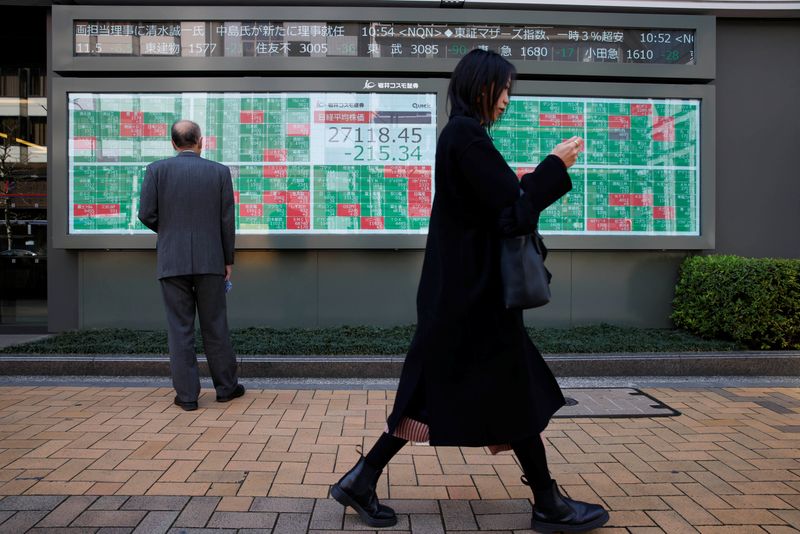By Alden Bentley, Amanda Cooper and Kevin Buckland
NEW YORK/LONDON/TOKYO (Reuters) -Global share markets advanced cautiously on Wednesday, led by an early rally in Japanese stocks as the yen sagged to its weakest since 1990, prompting intervention fears, while benchmark U.S. Treasury yields fell after a strong seven-year note auction.
Trading was subdued with the dollar stuck in a narrow range below its overnight high against the yen as markets marked time ahead of Friday's much-anticipated U.S. inflation report, that few will be around to digest at the start of the long Easter weekend in the United States and many other countries.
The yen, which has lost more than 7% in value against the dollar this year already, weakened as far as 151.975 to the dollar, prompting Japan's three main monetary authorities to hold an emergency meeting on Wednesday to discuss the currency.
Market participants took this as a signal officials were ready to intervene in the market to stop what they described as disorderly and speculative moves in the yen, a carry-trade favorite for speculators to short against other currencies because of its lower interest rates.
"The news this morning was the Japanese yen. They're always concerned, even well before this for so many years, about hedge funds coming in and taking advantage of the yen," said Quincy Krosby, chief global strategist at LPL Financial, in Charlotte, NC. "So they typically come out with the warning to notify the market that 'we could come in and thwart your ambition in our currency market'."
The yen has been sliding despite the Bank of Japan's first interest rate hike for 17 years last week, as traders expect very gradual tightening and possible delays to long-expected Federal Reserve easing.
BOJ board member Naoki Tamura reinforced the dovish outlook on further tightening on Wednesday, saying the central bank should "move slowly but steadily toward policy normalisation".
The stocks rally ramped up late in Wall Street's session. The Dow Jones Industrial Average rose 1.22%, to end at 39,760.08, outpacing the other main indexes because of a strong rally in Merck after the U.S. Food and Drug Administration approved its therapy for adults suffering from a rare lung condition.
The S&P 500 gained 0.86%, closing at 5,248.49 and the Nasdaq Composite gained 0.51% to 16,399.52.
The Nikkei closed 0.9% higher. MSCI's gauge of stocks across the globe rose 0.59%, while Europe's STOXX 600 index added 0.13%.
"It's choppy, directionless trading, and there's a good reason for that: we've hit that time of the quarter when rebalancing flows are impacting the market," said Tony Sycamore, a strategist at IG.
Another reason is that two key events - the release of the U.S. Federal Reserve's favoured Personal Consumption Expenditures Inflation Index and public comments from Fed Chair Jerome Powell - come on Friday, when most markets are closed for a holiday, he added.
Good Friday is a market but not a government holiday in the United States.
DOLLAR/YEN IN FOCUS
Against the yen, the dollar eased 0.15% to 151.32. {{2126|The dodollar index was down 0.14% at 104.28, just below Friday's five-week high of 104.49, while the euro was down 0.04% at $1.0826.
"If there's any kind of intervention, it only has a significant lasting impact if the direction of travel has already begun to turn," Guy Miller, chief market strategist at Zurich Insurance Group, said.
U.S. 10-year Treasury yields were 4.6 basis points lower at 4.188%. They had fallen as far as 4.182%, the lowest in two weeks, after the Treasury easily sold $43 billion of seven-year notes amid expectations that the Federal Reserve will be lowering rates soon.
Kim Rupert, managing director of global fixed income at Action Economics in San Francisco, described the auction as "stellar."
"It's a good time to pick up some yield," she said.
Traders are trying to gauge which of the big central banks - the Fed, ECB or Bank of England - will be first to cut rates this year.
Meanwhile, Sweden's Riksbank left interest rates unchanged but indicated it was likely to start easing monetary policy in either May or June.
Spot gold rose 0.73% to $2,194.43 an ounce as it continued to search for a short-term floor following its surge to a record $2,222.39 last week. U.S. gold futures rose 0.67% to $2,191.70 an ounce.
Cryptocurrency bitcoin fell 1.11% to $69,038.01.

Oil fell for a second day after a report that crude stockpiles surged in the U.S., the world's biggest oil user, and on signs major producers are unlikely to change their output policy at a technical meeting next week. [O/R]
Brent crude futures settled at $86.09 per barrel, down 0.19%. U.S. crude futures settled down 0.33% at $81.35 a barrel.